HOME > Japan SPOTLIGHT > Article
How Will the Art Market & the Rich Respond to Covid-19 & the National Security Law? The Future Remains Unclear for Art Basel Hong Kong
By Junko Iwabuchi
Optimism at Art Fair Last Year
When I came back from Art Basel Hong Kong in late March last year, I wrote an article describing how the art fair was thriving, with an incredible number of riches from all over the world in spite of the apparent increasing influence of mainland China (https://www.jef.or.jp/journal/pdf/226th_Special_Article_03.pdf). I did hear the locals talk about the fear of uncertainty for the future, but in subtle ways, and I had a firm belief that Hong Kong would remain as the strongest financial hub and the marketing center for luxurious products and services in Asia. I saw my old friends from well-known museums and met art collectors from the United States and Europe, had delicious dim sum with them, had lots of laughs, and had no doubts when we said to each other, "See you next year in Hong Kong, if not sooner elsewhere."
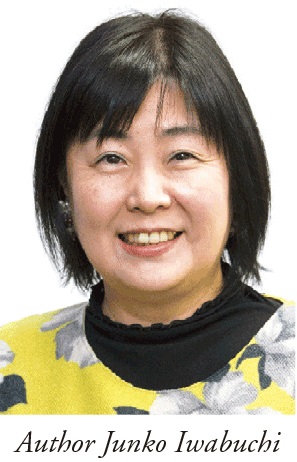
Things in Hong Kong are expensive, but there are always individuals who can afford them. There are people who willingly pay more than US$1,000 per night for a hotel room. The main partner for Art Basel is the Swiss Bank UBS, and for Art Central it is the Singaporean multinational banking organization UOB. Both are known to be good at private banking, or wealth management. Hong Kong is safe, my friends and I were thinking, as long as the rich keep their assets there. The power of Hong Kong is the wealth itself more than anything else, that is, to attract investors from abroad, and I've been aware of their understanding of the region as the window to mainland China.
I spoke with a young manager working at a posh Italian restaurant last year who told me that he was educated at a boarding school in Malaysia because it's less expensive than going to the United Kingdom or to Switzerland. You have to be fluent in English before applying for college level and a good education is valued by any Chinese family, but the cost has been becoming quite problematic in recent years. I asked him if he plans to remain in Hong Kong, or move outside if offered a good job elsewhere. He smiled and said, "I'm not sure right now, but we have enough relatives living in the US, Canada and Australia among our family members." I wonder what he is up to now after the recent introduction of the National Security Law.
Ambiguity, Doubt & Cancellation of Shows
I have seen demonstrations by Hong Kong people fighting for permanent democracy and freedom of speech numerous times since I returned from Art Basel last year. But I was still optimistic about going back to Hong Kong for the art fair this year until I started hearing about the outbreak of the novel coronavirus originating from Wuhan in January. That is when I decided to reach out to Adeline Ooi, the Asia director of Art Basel. I sent the following questions in writing via their administrative office in January still thinking that they would go ahead with the show. Adeline got back to me with these summary answers at about the same time as they announced the cancellation of the art fair for 2020 in Hong Kong.
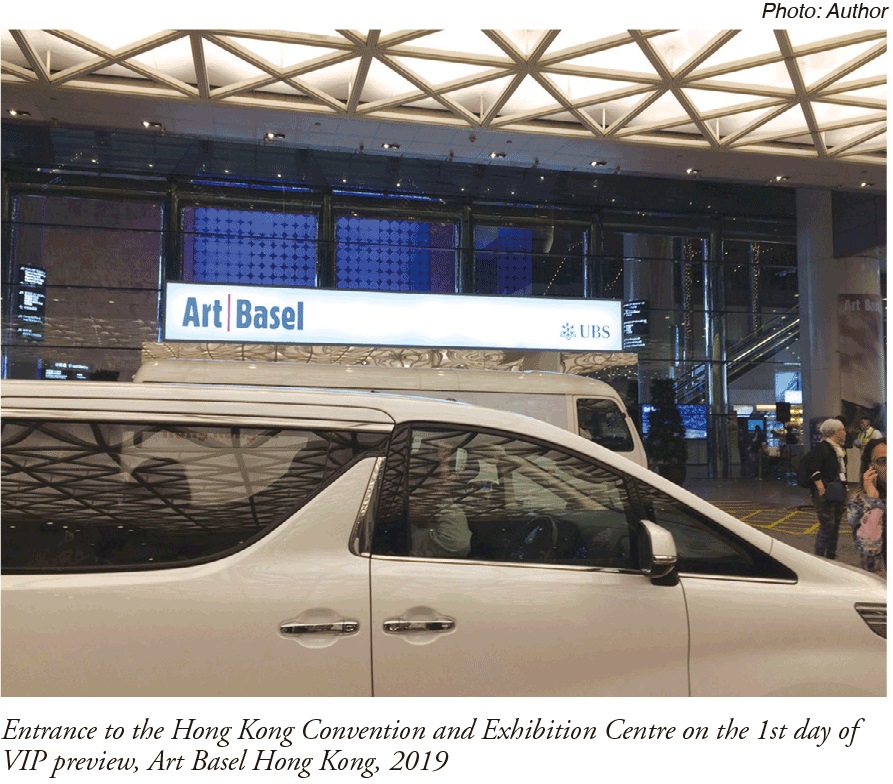
Q-1) How do you see the future of the Hong Kong art market? Do you have any contingency plans to move Art Basel to another city in Asia from Hong Kong?
A) It is really difficult to predict what the long-term impact of Covid-19 on the art market in general and the art market in Hong Kong will be. But we all know that Hong Kong is a resilient city, which it has proven in the past. We have made Hong Kong our home since 2013, with many members of our team based here, and we firmly believe that despite the current situation, long-term Hong Kong is the best location for our show.
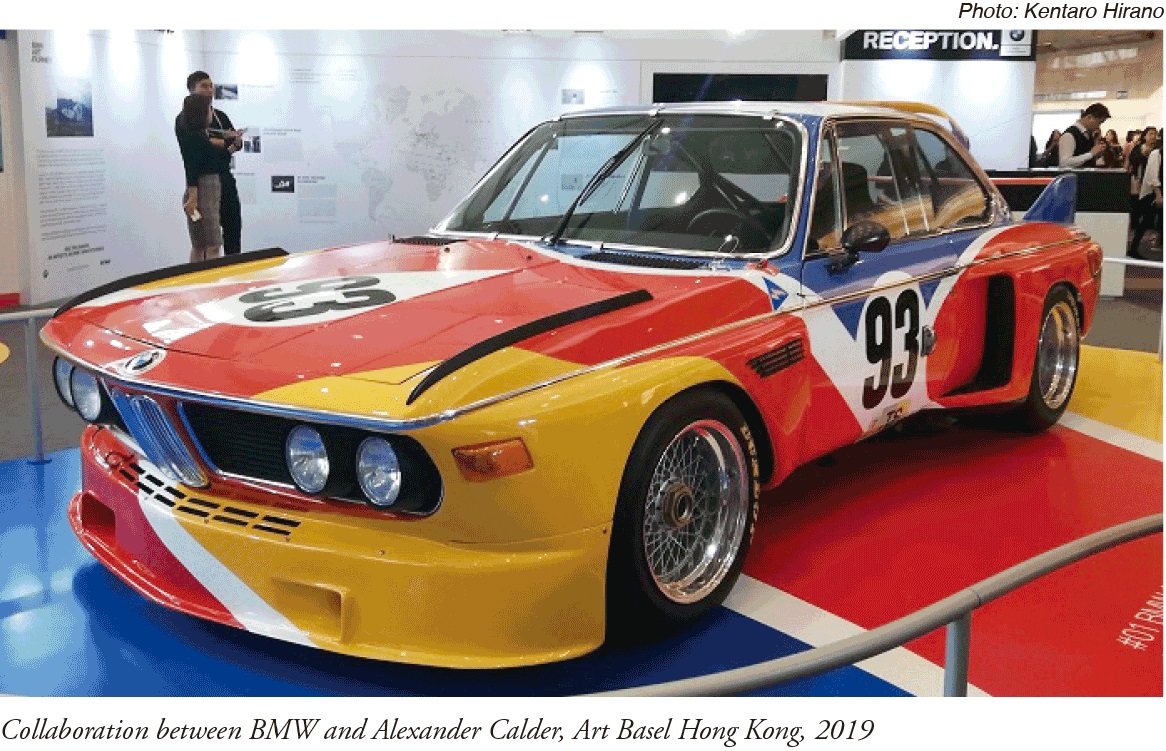
Q-2) When and why did you decide to cancel Art Basel Hong Kong 2020? What are the consequences of that decision and its impact for next year and beyond? Do you think the galleries and collectors will come back to Hong Kong next year?
A) We announced the cancellation of the Art Basel Hong Kong show on Feb. 6, 2020. Many factors contributed to this decision, including our fundamental concern for the health and safety of our staff and all those working at and attending the fair; the severe logistical challenges facing the successful build-out and transit of artwork to the show; and the escalating difficulties complicating international travel, all arising as a result of the outbreak of the coronavirus. We carefully reviewed all possibilities, including postponing the fair, which was not possible due to the occupation rate of the HKCEC (the venue). Cancelling the fair was the only viable option.
Our Hong Kong show provides a premier platform showcasing the best works from the region and beyond to our audience. We are in close contact with our exhibitors, who are very keen to come back in 2021 and, like us, are committed to Hong Kong. We therefore are very hopeful and optimistic that our galleries and collectors will come back to Hong Kong to see the works and exchange dialogues in person.
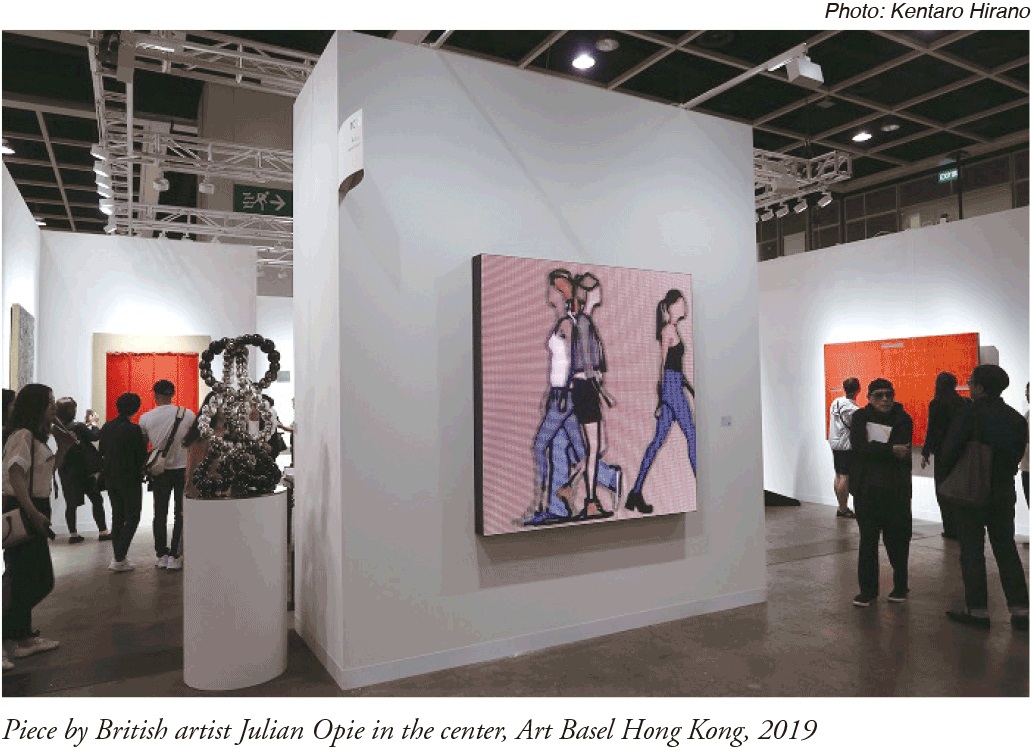
And later on June 6, I received a press release from the organizer saying they also came to a decision to cancel their main show in Basel, Switzerland, in September that was already postponed from their regular dates in June, as follows:
We hope this finds you safe and well in these challenging times. Following our letter to you last week, we are writing today to inform you that Art Basel in Basel will not take place this September.
The press release continued:
As you can imagine, this has not been an easy decision. While we are beginning to see signs of hope as individual countries are coming out of lockdown, the global situation remains precarious and, unfortunately, too many uncertainties remain to go ahead with the fair. These include the health risks posed by large gatherings, the limitations on intercontinental travel, and the unclear Swiss regulatory environment for shows of our dimension. Given these uncertainties, we believe the best option concerning the Basel show is to focus on next year's edition, and delivering a fair of the exceptional international quality that the art world expects from us.
We look forward to welcoming you back to Basel in 2021, when the fair will take place from June 17 to June 20, 2021, with preview days on June 15 and June 16, 2021. In the meantime, we hope you will be able to join us later this month for our Online Viewing Rooms, which will be live from June 19 to 26, 2020, with preview days from June 17 to June 19, 2020, and at our upcoming shows in Miami Beach this December and in Hong Kong in March 2021.
All of us at Art Basel hope to very soon see you again in person, surrounded by the great art that brings us together.
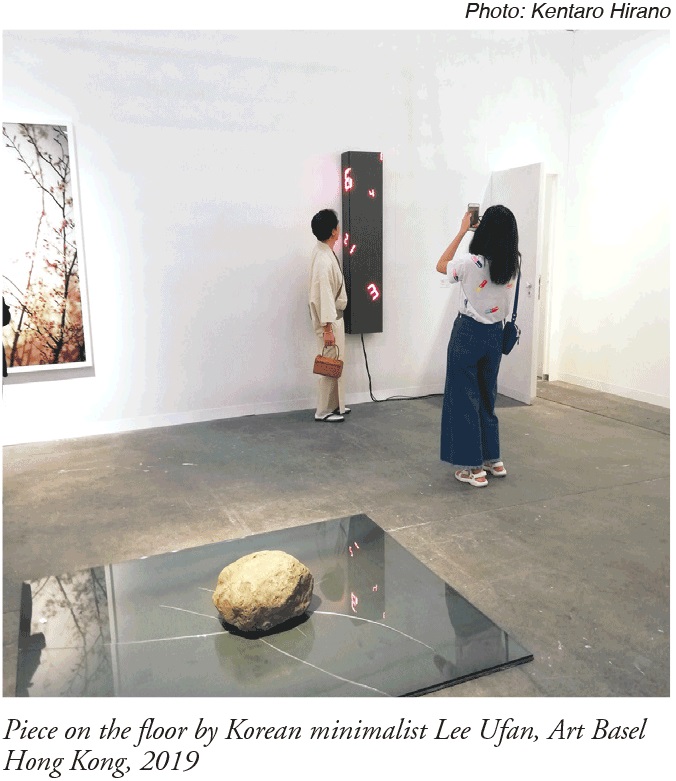
This press release was signed by Marc Spiegler and Michèle Sandoz, top executives of Art Basel worldwide. They did organize the Online Viewing Rooms from June 17 until 26 following the experiment in March substituting for the cancelled show in Hong Kong. There were also various online discussion forums with themes ranging from how to buy art online to examining the impact of Covid-19 on the art world in the coming years, and they turned out to be enormously popular.
Currently, the administrator, galleries and art collectors are hopeful of having their Miami edition of the art fair in December, but no one is certain what it is going to be like in winter as the number of infected people in Florida is rising and seems unstoppable. Also recently, the Frieze, another prominent art fair of modern and contemporary art in London, announced the cancellation of their October show. It is now evident that Covid-19 is the sole reason for making the business of art come to a standstill.

After the global director of Art Basel made the announcement of the cancellation of their Swiss edition of the show in the fall and the National Security Law was passed in Hong Kong on June 30, I decided to contact the Asian director regarding the prospect of Hong Kong Art Basel being staged next year. I asked if there was a concern among galleries and collectors about coming to Hong Kong in the future due to the political unrest and if the organizer has any contingency plans to move Art Basel to another city in Asia. I waited for several days, but Adeline's assistant replied in an email that she was not available to comment and that if I needed an "official comment" they could refer me to the executive office in Basel. I decided not to persist, as I am aware that these people actually live in Hong Kong and I don't want them to get into any trouble because of any careless questions I may ask.
May Hong Kong Stay Resilient
I wrote about this last year too, but every time I have been back to Hong Kong in recent years, I've noticed that there are fewer and fewer cab drivers at the airport who speak English. Maybe soon we will all be expected to speak with them in Chinese, or through a smartphone application that translates for you. But I feel sad and uneasy about this change of slow suffocation. One local gallery owner was already expressing uneasiness about the uncertainty of freedom of expression in the coming years and asking herself if she could continue organizing exhibitions with a political context. I wonder how she is feeling now as she has so many pro-democracy friends in Europe and they are all encouraging her to stay and fight. But who wants to risk their own freedom and life?
Wealthy collectors could probably buy art online themselves, or they can send their agent to Hong Kong to make their purchases on their behalf. In Switzerland, maybe they can fly there in their private jet and make an arrangement for private viewings in an air-conditioned warehouse in a bonded area of the airport. They have already done that in the past. But one thing is becoming increasingly obvious: art fairs may not remain as the most successful business model in the age of the coronavirus pandemic. This must be shocking news not only for the organizers of art fairs, but also for any art dealer and artist. We now have to face the question of how we sell works of art without going abroad or inviting people from other countries.
Hong Kong will continue to thrive as a gourmet capital of the world and remain a major storefront for goods and services for the rich. And as long as Hong Kong had an art fair that attracted world famous museum directors, curators and influential art collectors from all over the world, I thought that freedom of speech would be protected for many years to come. But that was before the National Security Law was enacted. My main concern is whether Hong Kong can remain as the financial hub of Asia, but I've been hearing discouraging news that many investors are beginning to move most of their assets to Singapore, which I had never seen in the past. They had always split their assets in Asia between Singapore and Hong Kong no matter what the political climate was. Wealth itself and multinational financial skills have been the armor of Hong Kong. If Hong Kong loses its wealth, the future of the region could be grim.
As long as large scale art events such as Art Basel can continue in Hong Kong and people from all over the world congregate there to view and discuss art, and disseminate what they think through social media, the future will remain bright, but if investors quietly leave Hong Kong, that will be when the real problems begin for the freedom of expression.
Japan SPOTLIGHT September/October 2020 Issue (Published on September 10, 2020)
(2020/10/08)
Junko Iwabuchi
Junko Iwabuchi is chief writer and partner at web media "Agrospacia" and adjunct professor at Aoyama Gakuin University. She is a former Helena Rubinstein Fellow at the Whitney Museum of American Art, New York, and participated in the Rotary Foundation scholarship program to study in Florence, Italy. She is a frequent contributor to newspapers and magazines in Japan on arts, culture, lifestyle and media.

Japan SPOTLIGHT

- Coffee Cultures of Japan & India
- 2025/01/27
























